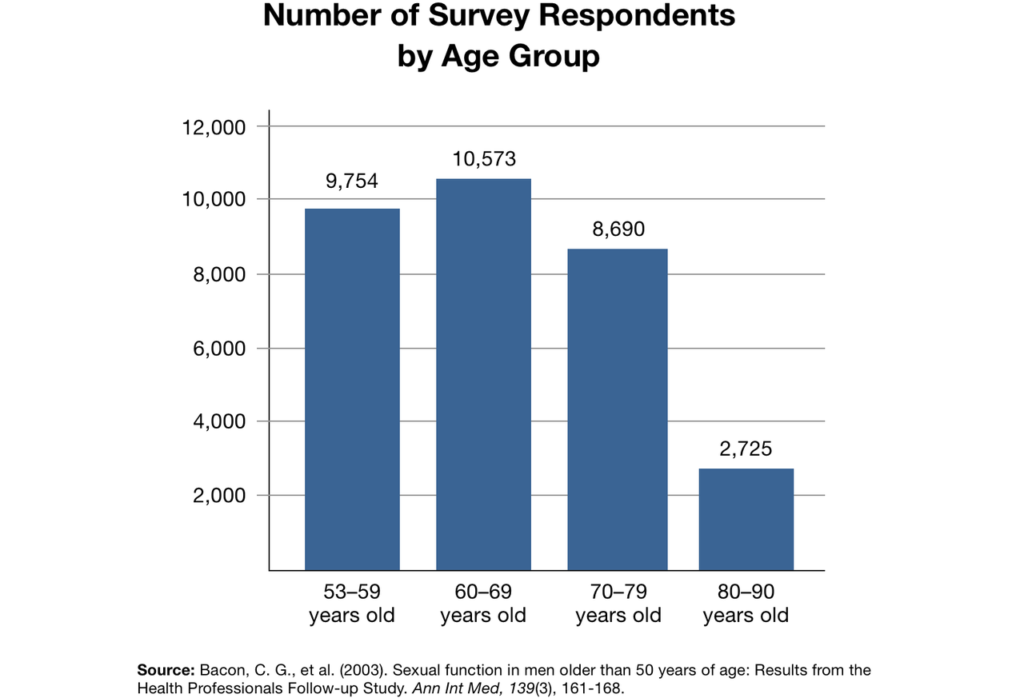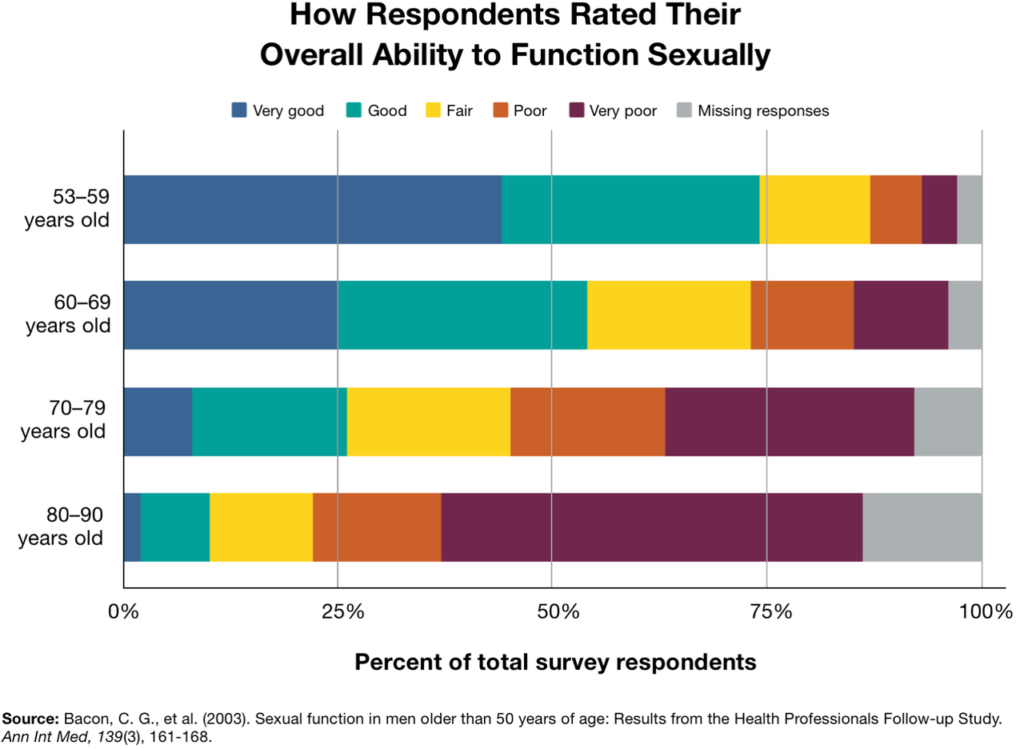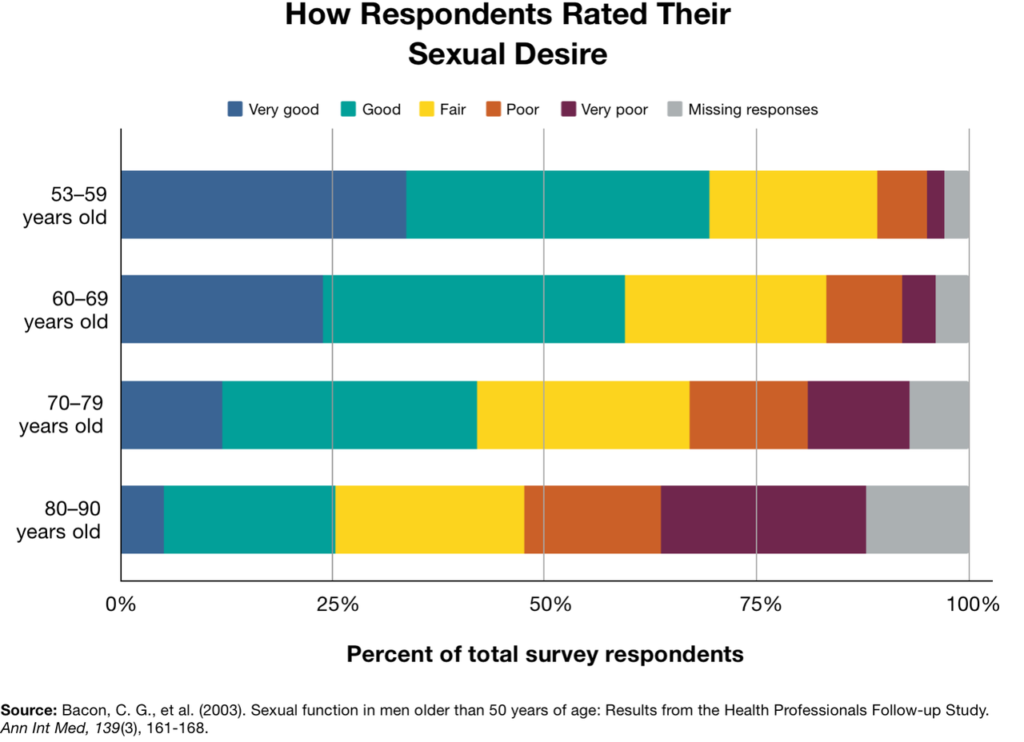The following information can be found in further detail at GoodRX Health.
In the study with the most male participants to date, researchers surveyed 31,742 male health professionals from the U.S. to understand how age and other factors affect rates of erectile dysfunction. (Men with prostate cancer, which can cause ED, were not included in the study.) Results from those surveys, which we’ll discuss below, were published in 2003 in the Annals of Internal Medicine. Here’s a breakdown of the survey respondents by age:

The survey results from this study showed that the majority of men ages 53 to 59 years old (74%) rated their ability to function sexually as “good” (30%) or “very good” (44%). At the older end of the spectrum, the opposite happened: The majority (64%) of men 80 to 90 years old rated their ability to function sexually as “poor” (15%) or “very poor” (49%). Only 10% of men over age 80 gave ratings of “good” (8%) or “very good” (2%).

In addition to these findings, the study looked at how the desire to have sex changes as men age. The group of men between the ages of 53 and 59 generally felt that their desire to have sex was good. Seventy percent of these men said their desire was either “good” (36%) or “very good” (34%). In contrast, only 26% of men 80 to 90 years old said their desire was either “good” (20%) or “very good” (6%).

This study also noted a strong link between age and erectile dysfunction. Specifically, less than 2% of men who reported erection problems said that they first started before they were 40 years old, and only 4% said that they first started between 40 and 49 years of age. But looking at 50 years of age and beyond, there was a sharp increase. About a quarter of men said that erection problems started between age 50 and 59, and 40% said they started between ages 60 and 69.
Having chronic diseases and other risk factors matter with respect to ED, too. In the study, the researchers looked at the following chronic diseases:
-
Heart disease
-
Hypertension
-
Diabetes
-
Stroke
-
Cancer (other than prostate cancer)
They also noted the following risk factors:
-
Taking antidepressant medications
-
Having more than 2 alcohol drinks per day
-
Smoking
-
Being overweight or obese (BMI of 25 kg/m² or above)
-
Exercising infrequently (less than 21.5 metabolic equivalents per week)
-
Watching TV for more than 8.5 hours per week
They found that men with none of these diseases or risk factors had the lowest rates of erectile dysfunction at all ages.
These findings are in line with results from other leading studies looking at age and sexual function in men. Take the Massachusetts Male Aging Study, for example. This was one of the first large studies to look at the link between age and erectile dysfunction. For this study, researchers interviewed 1,085 men ages 40 to 70 for 9 years between the late 1980s and mid-1990s. The results showed a strong link between worsening sexual function and advancing age, along with a drop in how often men were having sex and how many monthly erections they were recording as they got older.
A later 2007 study investigating the sexual habits of 1,455 U.S. men (along with 1,550 women) also found that erectile problems are more common in older men compared to younger men. And it backed up the strong link we mentioned earlier between being in “good health” and having lower rates of sexual problems and higher rates of sexual satisfaction — interestingly, much more so in men than women. The most common reason for sexual inactivity in the men and women surveyed was the poor health of the male partner. Of those 57 to 85 years old who said they were in intimate relationships but were sexually inactive, 55% of men and 64% of women reported poor health of the male partner as the main reason for their sexual inactivity.
Another 2007 study looked at data collected from 2,126 men surveyed in the 2001 to 2002 U.S. National Health and Nutrition Examination Survey (NHANES), and published figures specifically about erectile dysfunction. The findings mirrored the trends seen in other studies: 5% of men 20 to 39 years old experienced erectile dysfunction compared to 70% of men above 70 years of age. Again, strong links were seen between erectile dysfunction and poor health: Almost 90% of men with erectile dysfunction had cardiovascular disease or at least one major risk factor for it (for example, high blood pressure, high cholesterol, cigarette smoking, or diabetes). And they were much less likely to be physically active, too.
The last study we’ll detail here is the Global Study of Sexual Attitudes and Behaviors (GSSAB), a survey of 13,882 women and 13,618 men ages 40 to 80 years from 29 different countries. The purpose of this study was to collect data on all aspects of sex and relationships across different ethnicities and cultures. The effect of age on erectile problems was strong across all regions and cultures, and the links between erectile problems and other health problems were similar.
Other risk factors of ED
While age itself seems to be linked to ED, many other things can increase a man’s chances of experiencing erectile dysfunction, regardless of age. These include health conditions like:
-
Diabetes
-
Heart disease
-
High blood pressure
-
High cholesterol
-
Depression
It can also be related to lifestyle habits like not exercising regularly. In particular, being overweight can significantly impact your risk for ED. Many men reduce their activity levels and gain weight as they get older, which makes ED a very real possibility for many men of older age.
Drinking alcohol and smoking are both related to ED, as well. In the USHP study, those who drank in moderation and did not smoke were less likely to have erectile dysfunction compared to those who drank alcohol in excess and smoked regularly.
Lastly, several common medications can increase the likelihood of having ED, too, such as certain antidepressants, opioid pain medications, and even some blood pressure drugs.


